O GÁS NATURAL LIQUEFEITO (AINDA) ADORA GREENWASHING
15.10.2025
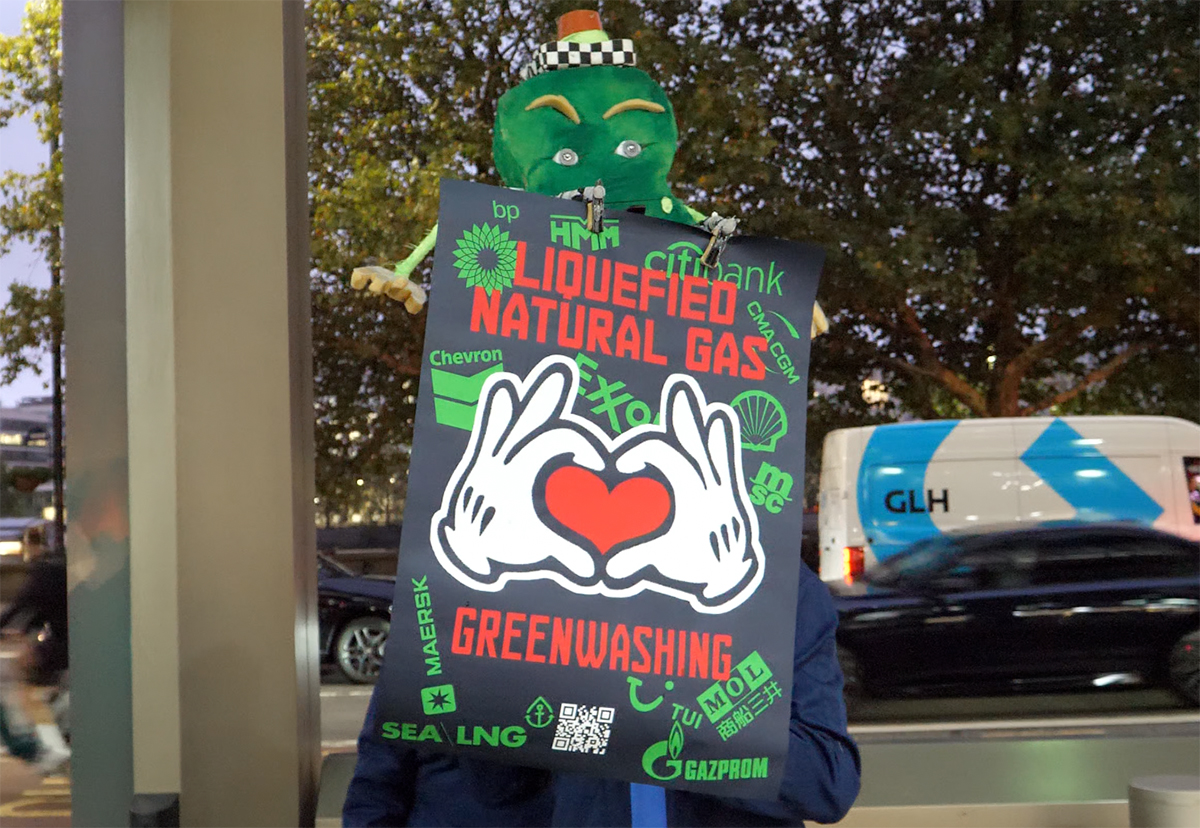
⬆️ Scrubby prepara-se para colar cartazes nas janelas da ONU IMO.
-
A 2ª Sessão Extraordinária da Organização Marítima Internacional (OMI) da ONU reúne-se esta semana. Trata-se de uma reunião em que os delegados da OMI e os Estados-Membros estão a finalizar os planos para regulamentar a poluição causada pelos navios.
Para assinalar esta ocasião especial, pensámos em recordar-lhes que nem todas as emissões de gases de escape são tratadas da mesma forma. De facto, algumas podem nem sequer ser consideradas. Na semana passada, a Shell anunciou planos para extrair mais gás natural liquefeito - o combustível que a indústria do petróleo, do gás e do transporte marítimo está a pressionar para ficar isento dos regulamentos da OMI relativos à poluição marítima.
⬆️ A redecoração das janelas está pronta!
-

⬆️ Porque é que há cartazes na janela? É para lembrar aos Estados-Membros e delegados da OMI da ONU que todos os combustíveis fósseis devem ser tratados da mesma forma. Afinal de contas, o ‘Gás Natural Liquefeito ❤️ Greenwashing’ só acontece quando o GNL escapa aos regulamentos de poluição planeados para o transporte marítimo.
-

⬆️ Aí vem o Scrubby com outro cartaz.
-
O destino do Oceano depende de todos nós.
As nossas intervenções dependem do seu apoio.
Às 18:00 horas, enquanto os delegados saboreavam canapés e bebiam vinho, um ‘Scrubby, a esponja do greenwashing’ apareceu à janela da sua receção com um cartaz. Um cartaz que continha a mensagem gráfica ‘O GÁS NATURAL LIQUEFEITO ADORA O GREENWASHING’. O precário Scrubby, que se movia numa longa vara de 4 metros, colou o cartaz na janela, dando a todos os presentes a oportunidade de aplaudir as suas maravilhosas habilidades. De seguida, o Scrubby desceu até ao chão para apanhar outro cartaz e repetir o processo até que as janelas da OMI estivessem tapadas.
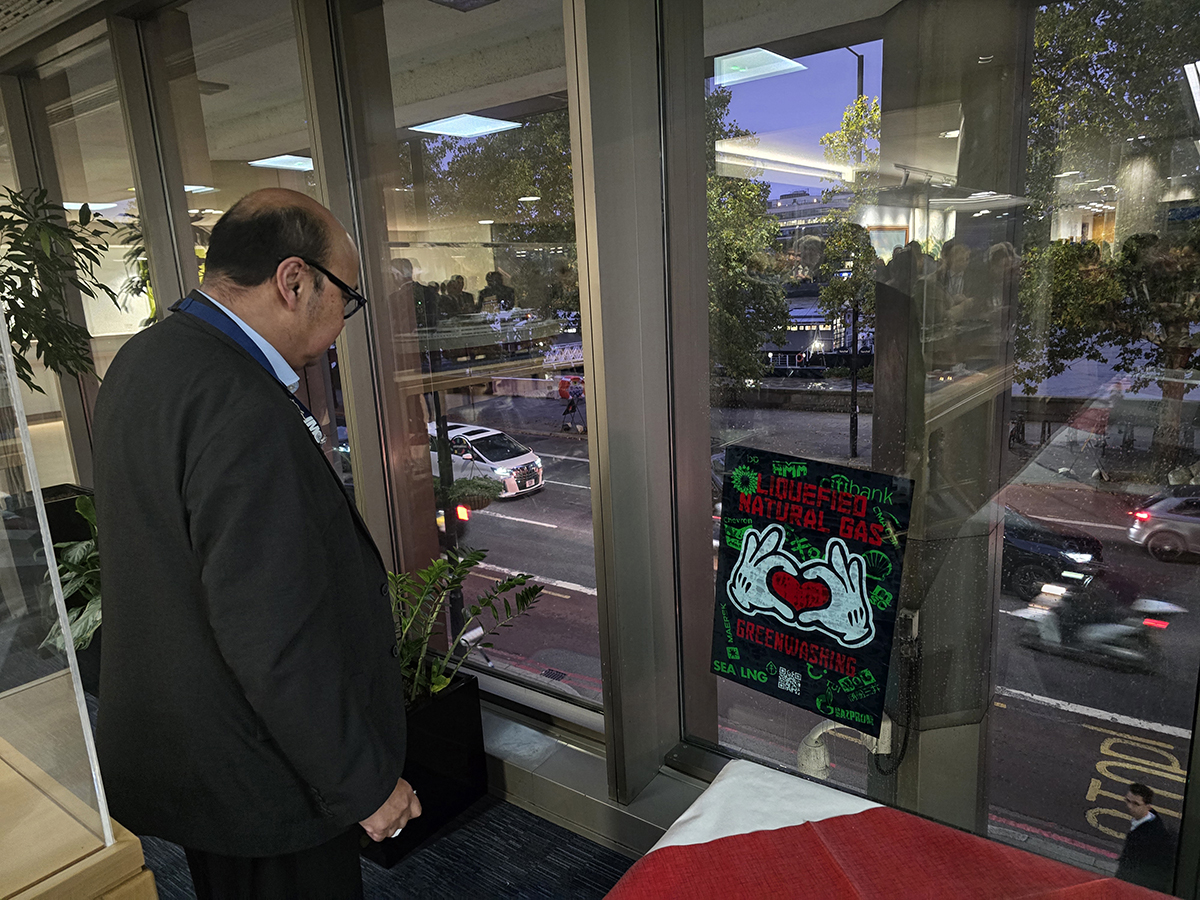
⬆️ É altura de analisar mais de perto quem tem estado a fazer "greenwashing" ao GNL. Não é preciso ir muito longe, os membros da MAR/LNG fornece uma lista completa dos patifes. O petróleo e o gás não podem fazer parte do ‘futuro do transporte marítimo’. Se a OMI da ONU está a falar a sério sobre a redução da poluição, o transporte marítimo tem de deixar de utilizar combustíveis fósseis.
-
Scrubby representa a lavagem verde flagrante que dará ao GNL um passe livre para evitar quaisquer planos do MEPC para incluir o GNL nos regulamentos de poluição do transporte marítimo/taxas fiscais - tornando o GNL o combustível fóssil de eleição para o transporte marítimo (enquanto continua a acelerar as emissões perigosas e os lucros obscenos para as indústrias de combustíveis fósseis e de transporte marítimo). O ‘Scrubby, a esponja da lavagem verde’ estava empenhado em garantir que O futuro do transporte marítimo mensagem em nome de SEALNG.ORG foi visto por todos os delegados e Estados-Membros da OMI.
Afinal, o Scrubby não queria que os seus patrões, as indústrias dos combustíveis fósseis e do transporte marítimo, perdessem a oportunidade de fazer "greenwash" ao GNL antes das discussões do MEPC sobre as taxas de combustível para o transporte marítimo (que empresas como a CMA CGM e Exxon Mobil bem como sociedades de classificação como DNV e ABS esperança que o GNL possa evitar, vendendo-se como o combustível ‘verde’ que certamente não é).
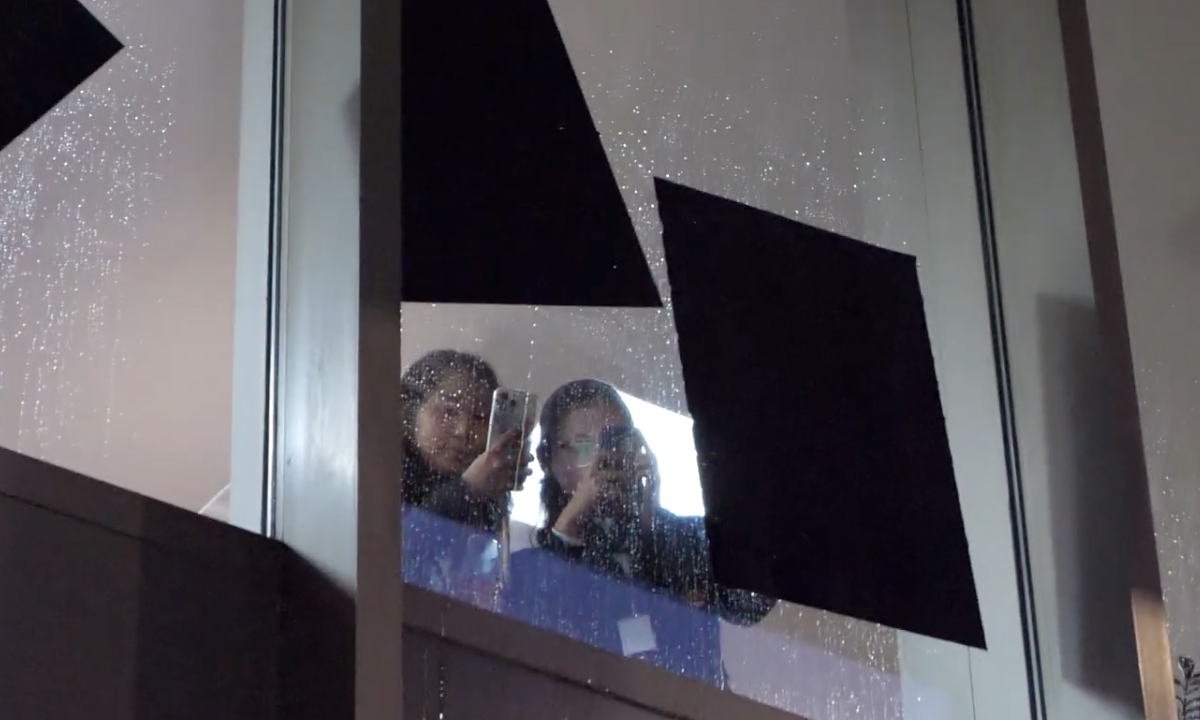
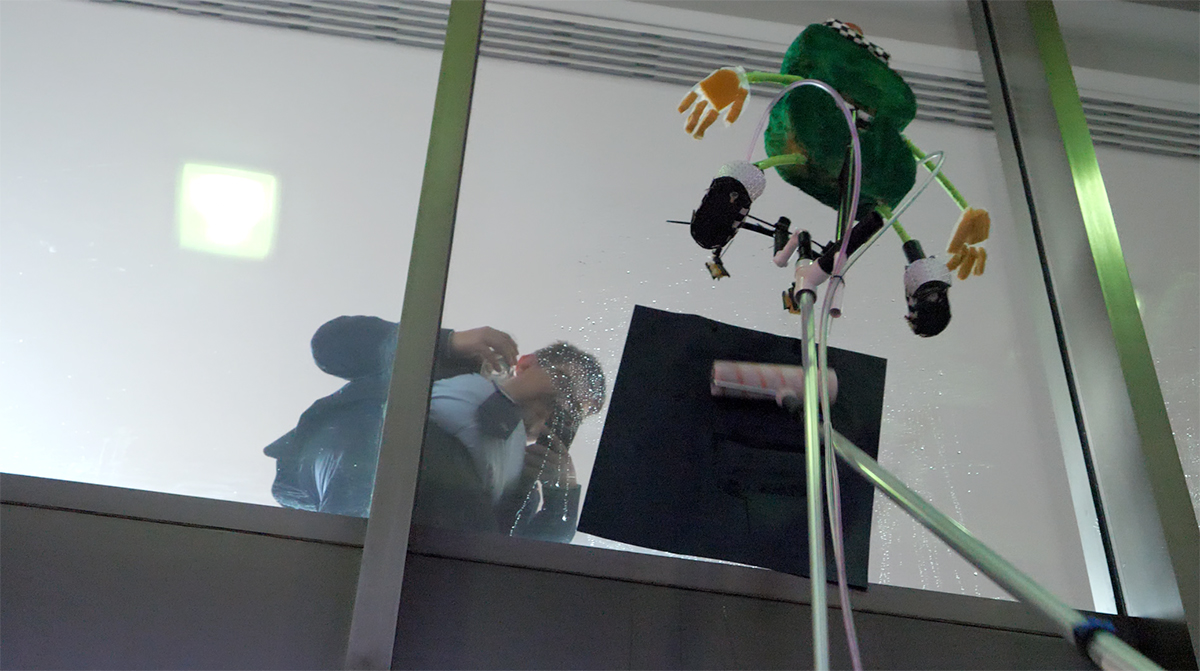
⬆️ Os delegados tiram fotografias dos cartazes.
-
O espetáculo celebra o fantochismo desenfreado que grassa nas reuniões do MEPC. Reuniões dominadas pelos interesses da indústria naval, uma indústria empenhada em cimentar o seu romance com a indústria do petróleo e do gás, adoptando o GNL sujo como combustível de eleição. Isto apesar da investigação recente que expôs as mentiras das plataformas de lobbying industrial como MAR/LNG. A investigação revista por pares revela que o GNL extraído e exportado dos EUA é 33% mais poluente do que o carvão, disputando o título de mais letal dos combustíveis fósseis. As fugas de metano ocorrem durante todo o processo de extração e fornecimento de GNL, aumentando os níveis de mortalidade e causando problemas de saúde. E a extração de GNL destrói terras e comunidades costeiras onde quer que surja uma fábrica de GNL. Estas mesmas fugas continuam a bordo Navios movidos a GNL, A indústria está a contribuir para acelerar o colapso climático e o colapso das nossas economias. Para encobrir esta verdade incómoda, a indústria apregoa "biometano e "e-metano produtos que representam apenas 6% do mercado da UE e ainda menos a nível mundial (e ambos continuam a libertar metano ao longo das suas cadeias de abastecimento e, no caso do biometano, utilizam recursos terrestres e fazem aumentar a escassez e os preços dos alimentos). A escala industrial do greenwashing do GNL transformou o MEPC da OMI da ONU num fantoche da indústria do petróleo e do gás.

⬆️ “Este é um terreno privado, por favor saiam agora!!!”
“Vou tentar, senhor, mas por favor tenha cuidado com o chão molhado, é bastante escorregadio.”
“Vão-se embora, saiam desta terra, estão a cometer uma infração leve”.”
“Faço-o se retirar a barreira, a minha anca não está muito boa e não consigo passar por cima dela...”
-
Gás Natural Liquefeito (GNL) - os factos
O GNL é um combustível fóssil que, quando extraído, transportado e queimado como combustível marítimo, derrama metano para a atmosfera - um perigoso gás de aquecimento global que está acabado 80-vezes mais aquecimento climático a curto prazo (20 anos) do que o dióxido de carbono.
O Painel Intergovernamental sobre Alterações Climáticas (IPCC) da ONU identificado cortes rápidos das emissões de metano como uma das principais prioridades, a fim de limitar o aquecimento global a cerca de 1,5°C o mais próximo possível. Os IPCC's último relatório A concentração na mitigação do clima torna claro que o gás fóssil sob a forma de GNL não é uma solução para a descarbonização da navegação.
Contrariamente ao que a ciência do clima exige, as empresas de navegação e portuárias têm andado a todo o vapor, a investir fortemente em GNL fóssil, alegando que o combustível reduzirá os seus impactos ambientais e a poluição climática. Existem atualmente mais de 785 novos navios de carga encomendados a nível mundial, sendo que mais de 400 estão a ser construídos para funcionar com GNL fóssil sujo.
A queima de mais GNL fóssil a bordo dos navios é um desastre para o nosso planeta. Só aumentaria as emissões de metano dos navios, que já registaram um aumento de 180% entre 2016 e 2023, de acordo com um estudo recente Relatório do Conselho Internacional para os Transportes Limpos (ICCT).
As emissões de metano também diminuem a qualidade do ar. Além disso, o aumento da procura de GNL - incluindo no sector marítimo - conduz a impactos adversos em terra, como a poluição da água potável, a redução da produção agrícola e o aumento das taxas de mortalidade prematura.

⬆️ Regulamentar a poluição causada pelos navios é um trabalho que dá fome. Infelizmente, os canapés não chegaram a ser servidos ao ar livre.
-
Precisamos de regulamentos rigorosos sobre o metano na OMI
De acordo com o IPCC (AR6)Para que a UE possa fazer face à emergência climática e aos seus impactos devastadores sobre as pessoas, é necessário combater urgentemente as emissões de metano a curto prazo. Os proponentes do GNL estão a iludir os decisores políticos sobre a verdadeira dimensão dos impactos do GNL no clima e na saúde, ao mesmo tempo que põem em risco um futuro de sobrevivência neste planeta.
A Organização Marítima Internacional (OMI) é o organismo das Nações Unidas que regula o transporte marítimo internacional. Atualmente, não existe regulamentação internacional específica para as emissões de metano dos navios. No entanto, existem várias oportunidades para integrar de forma abrangente o metano no quadro regulamentar da OMI durante o Comité de Proteção do Ambiente Marinho (MEPC82). Se tal não acontecer, propomos um futuro mais drástico para a OMI.
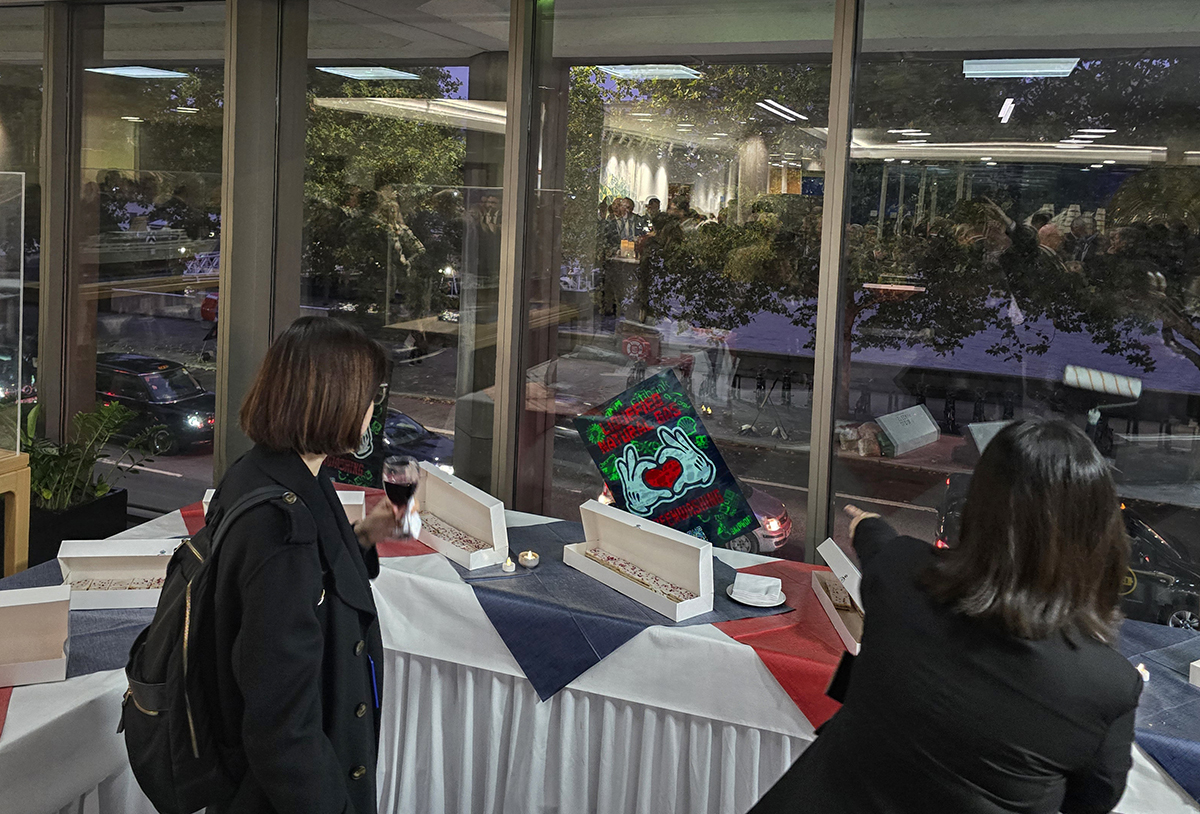
⬆️ “Olha para o cartaz que o boneco colou à janela!”
“Será que isso significa que somos cúmplices da lavagem verde?”
Sim, é verdade, e a ONU também, se não regulamentar o metano (o subproduto com fugas do GNL) juntamente com outros combustíveis fósseis.
-
Apelo à ação na OMI:
O GNL é um combustível fóssil que tem um impacto negativo sobre as pessoas, o ambiente e o clima em todas as fases do seu ciclo de vida.
Exigimos:
1. As emissões de metano são consideradas como um gás com efeito de estufa e incluídas em quaisquer planos do MEPC para aplicar um imposto sobre o carbono ao transporte marítimo, ponderado pela capacidade excessiva de forçamento climático do metano fugitivo.
2. Os Estados-Membros da OMI reconhecem o GNL como um combustível fóssil e deixam de se deixar enganar pela SEA LNG os lobistas, excluindo-os da OMI.
3. A OMI para promover a eficiência e a utilização da vaporização lenta, a redução da capacidade e embarcações à vela e eléctricas incentivando a adesão ao sector do transporte marítimo, capacitando e melhorando as competências dos trabalhadores e introduzindo rotas marítimas mais justas.
Se a OMI não atuar, a Rebelião dos Oceanos exige:
A ONU deve formar um novo organismo, transparente e representativo, para governar o Oceano em benefício de TODA a vida. Este novo organismo deve ter como única medida de sucesso a restauração e o reabastecimento do Oceano, do qual dependem todas as nossas vidas. Deverá substituir o poder das empresas pelo poder das pessoas. E deve representar as muitas formas de vida marinha que efetivamente fazem do oceano a sua casa.
-
Fotografias de S. Staines.